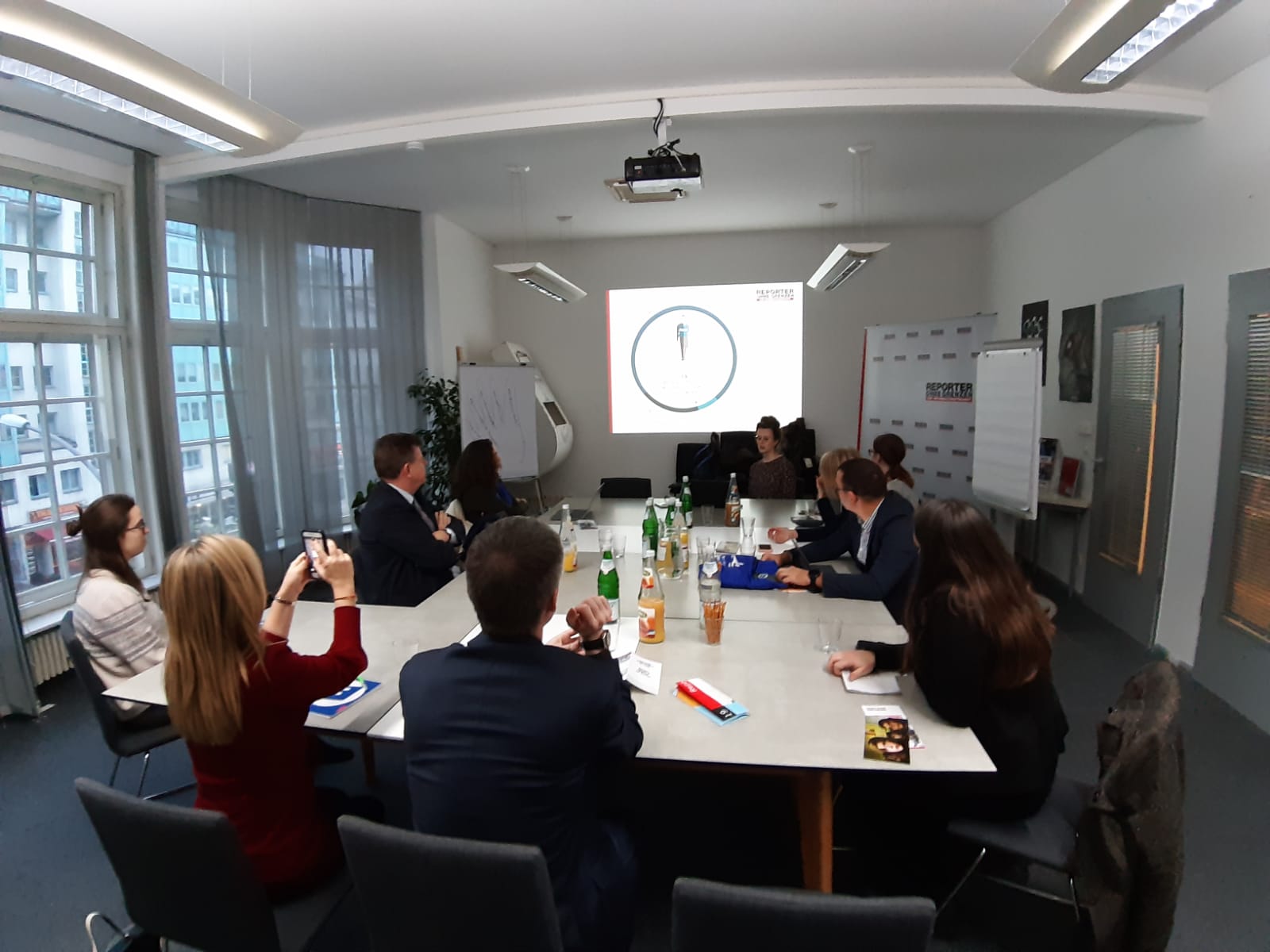Turkish-Russian-Dialogue

The delegation during the discussion with Reporters without Borders (RSF)
©As the first delegation of the year, the International Academy for Leadership (IAF) welcomed a group of journalists from Russia and Turkey. The visiting programme was part of the Turkish-Russian Dialogue, in which journalists from both countries share their experience with shrinking spaces of press and media freedom. The Turkish-Russian Dialogue is part of a global approach to foster freedom of expression of the Friedrich Naumann Foundation (FNF).
The situation for journalists in both countries is difficult these days. In Turkey, especially any criticism of the president is highly sensitive. Such criticism has in the past let to accusations of support of terrorist organisations and has led to journalists having been sentenced to prison terms. International correspondents on the other hand have lost their accreditation. There is much talk of censorship and self-censorship for fear of government retribution. From the discussions stays a clear impression that that the press and media freedom in Turkey remain in danger.
The situation in Russia is comparable difficult. The quick and non-bureaucratic deletion of defiant websites and blogs is a common practice of Russian authorities to interfere with critical journalists and writers. Some journalists even face violence and intimidation, which usually goes unpunished. Following a trend ever more restrictive laws over the recent years, Russian authorities passed a new internet law in November 2019. With the new law, Russian authorities lay the infrastructure to being able to isolate the internet in the country from the rest of the world wide web. Reporters without borders ranks Russia 149th out of 180 countries in terms of press freedom. Turkey even ranks on the 157th.
To create a platform for engagement for journalists, human rights advocates and young liberals from both countries, the Foundation’s offices in Istanbul and Moscow established the programme Turkish-Russian-Dialogue, in short #trusd. In the “shrinking spaces” of Russia and Turkey, the programme aims to creating horizontal networks and opportunities for exchanging experiences and best practices.
The group consisted of three journalists from Russia and two journalists and a communications scholar from Turkey. Before they came to Berlin, they met officials in Brussels from the European External Action Service (EEAS), The European Federation of Journalists, the European Endowment for Democracy and a liberal Member of the European Parliament. The group was accompanied by the head of the FNF office in Istanbul Dr. Ronald Meinardus, who himself used to work as a foreign correspondent for Deutsche Welle.
After their arrival in Berlin, the group met with Human Rights Watch to discuss the state of human rights in times of rising populism. On the second day of their stay, they went to the Berlin office of the newspaper “Der Spiegel” and had the opportunity to visit the newsroom and discuss the emergence of new online news media. For lunch, the group went to the Reichstag building to enjoy the view of the dome and to meet with the Member of German Bundestag Alexander Kulitz of the Free Democratic Party (FDP) to talk about the situation of freedom of expression and freedom of press in Russia and Turkey. The focus was on liberal approaches to support human rights and the freedom of press - and the challenges of liberal democracies facing populism, extremism and xenophobia. After a visit in the Federal Foreign Office, where the participants had the opportunity to raise the awareness for the situation of media representatives in their countries, the group met with Reporters without Borders (RSF). The delegates assessed the current state of journalism and the free speech violations for the representatives of RSF and informed themselves about the frontline services of RSF. In the evening, the delegation went to the newspaper taz to speak about their magazine taz gazete, which was founded by members of taz and Turkish writers, who, due to persecution, have fled Turkey and are now living in Germany.
On the last day of the programme, the group debated with Ms. Volkmann-Schluck from the German Press Council about self-regulation in the media sector and how journalistic quality can be ensured through this tool. Subsequently, the delegation came together with Peter Cichon from the international journalist and media programme of FNF to talk about how to enforce press freedom and which actions are taken by FNF.
Certainly, the programme gave the participants ample space for exchange on a formal level during the numerous meetings and on a more personal note during the free time, the group spent together in Berlin. In internal debates and discussion with the interlocutors, the group had the chance to exchange opinions and different experiences, which broadened the perspective on the topic. However, the advocacy for freedom of speech and the press is a never-ending story. The Friedrich Naumann Foundation for Freedom is committed to continue its support both in Turkey and in Russia and on a cross-country level as with the Turkish-Russian Dialogue.